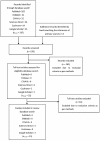Medication Reconciliation at Discharge from Hospital: A Systematic Review of the Quantitative Literature
- PMID: 28975903
- PMCID: PMC5597088
- DOI: 10.3390/pharmacy3020053
Medication Reconciliation at Discharge from Hospital: A Systematic Review of the Quantitative Literature
Abstract
Medicines reconciliation is a way to identify and act on discrepancies in patients' medical histories and it is found to play a key role in patient safety. This review focuses on discrepancies and medical errors that occurred at point of discharge from hospital. Studies were identified through the following electronic databases: PubMed, Sciences Direct, EMBASE, Google Scholar, Cochrane Reviews and CINAHL. Each of the six databases was screened from inception to end of January 2014. To determine eligibility of the studies; the title, abstract and full manuscript were screened to find 15 articles that meet the inclusion criteria. The median number of discrepancies across the articles was found to be 60%. In average patient had between 1.2-5.3 discrepancies when leaving the hospital. More studies also found a relation between the numbers of drugs a patient was on and the number of discrepancies. The variation in the number of discrepancies found in the 15 studies could be due to the fact that some studies excluded patient taking more than 5 drugs at admission. Medication reconciliation would be a way to avoid the high number of discrepancies that was found in this literature review and thereby increase patient safety.
Keywords: Medication reconciliation; medication discrepancies; medication errors; review.
Conflict of interest statement
The authors declare no conflicts of interest.
Figures
References
-
- Andel C., Davidow S.L., Hollander M., Moreno D.A. The economics of health care quality and medical errors. J. Health Care Financ. 2012;39:39–50. - PubMed
Publication types
LinkOut - more resources
Full Text Sources
Other Literature Sources


